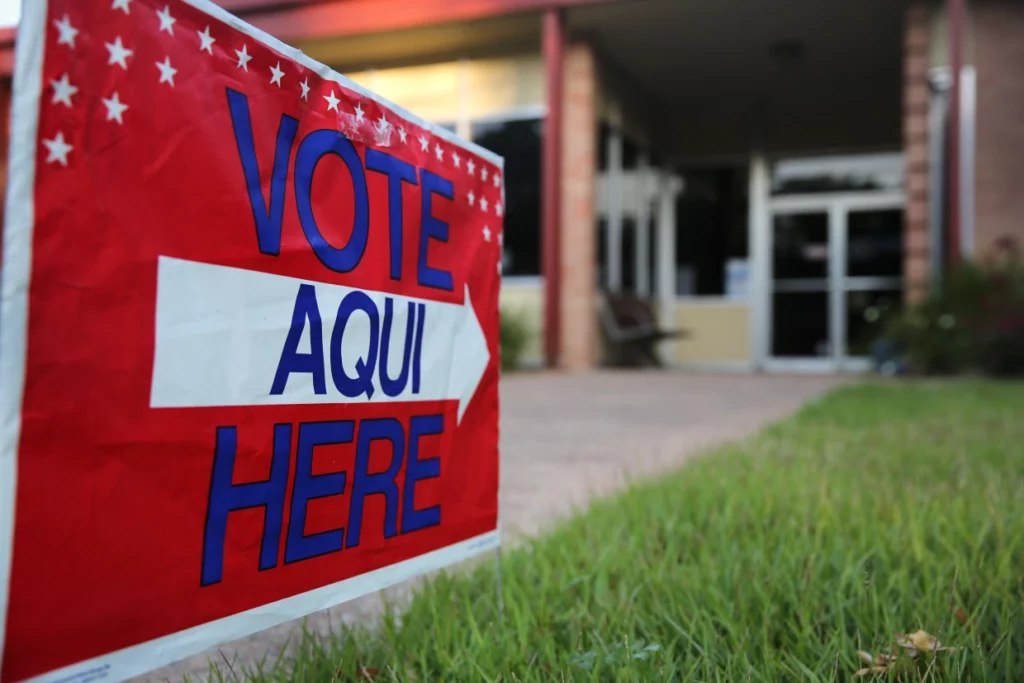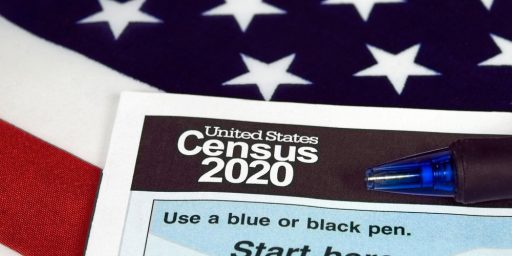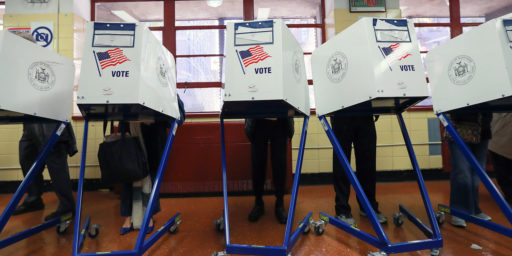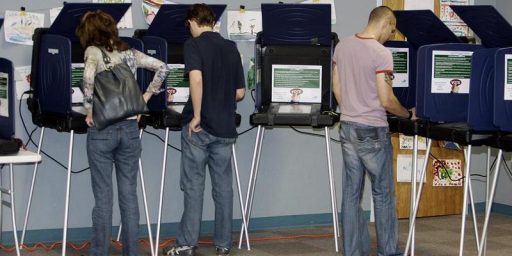Universal Voting Rights
DC has radically expanded its electorate.

Bolts (“Pair of Reforms to Expand the Electorate Become Law in D.C.“):
In the shadow of Congress and the White House uniting to block criminal-code changes passed by Washington, D.C., two bills that will transform the city’s voting rules became law this week.
One reform, which drew the ire of congressional Republicans, will enable noncitizen residents to vote in local elections. The second largely flew under the radar of national politicians, and will overhaul the city’s approach to voter registration.
Underlying the Automatic Voter Registration Expansion Amendment Act, that seemingly technical bill, is a challenge to a core aspect of U.S. elections. Why put a burden of registration on prospective voters when public authorities can determine who is eligible on their own?
Going forward, D.C. will use the information it collects when residents interact with public agencies like the Department of Motor Vehicles to create a running list of people who are “preapproved” to vote. For people on this list, there will be no need to register in advance of an election; all they will have to do is vote.
This new law would pair with a reform that the council has adopted but is not yet law, which would set up universal mail-in voting: That bill would apply to people on the “preapproved” list. As a result, D.C. would mail ballots to people it knows are eligible to vote—even if they have not registered.
“Unlike other parts of the country where we’re seeing people try to restrict the ability of people to get to the polls and to vote, in D.C., we want everyone to be able to vote,” Councilmember Charles Allen told Bolts last year when he filed the bill. This act, he said, will “make sure we are really reaching every single person we possibly can to make sure they can participate and have their voice heard.”
The bill was approved unanimously by the D.C. council in December and signed by the mayor. It became law after the customary congressional review that all D.C. bills undergo expired this week. Republicans in Congress did not target this legislation, though they sought to block other recent city reforms, including a bill that enables noncitizens to vote in local elections.
Offhand, this strikes me as a move in the right direction. It’s frankly bizarre for citizens to have to tax affirmative steps, such as filing income tax returns or registering to vote, when the government already has the necessary information in triplicate. DC’s government knows who’s allowed to drive in the city, required to pay taxes in the city, etc. That’s the same pool of people who are eligible to vote, so why not make it easy?
The obvious counterarguments are twofold. First, plenty of people who live in the city (noncitizens, convicted felons, etc.) are ineligible to vote. Second, this move makes it easier for people to commit vote fraud—either voting twice in DC (once in person, once by mail) or in DC and wherever else they were already registered.
Both of these are pretty easily solvable, though. First, one imagines a vanishingly small number of people are going to risk criminal penalties to vote twice; hell, most don’t bother to vote once. Second, DC could notify other jurisdictions of new “registrations” in DC. Presumably, obtaining a DC driver’s license is a declaration that DC is one’s primary residence. Third, there are already safeguards to ensure that a given resident’s vote is only counted once.
As to noncitizens, well, that’s been taken care of.
That noncitizen voting bill, known as the Local Residents Voting Rights Act, also became law this week. The U.S. House voted to block it in January in a resolution proposed by the GOP and supported by some Democrats, but the Senate did not follow up by the March 14 deadline that was set by the chamber’s parliamentarian.
As a result, noncitizens who have been residents of D.C. for 30 days will be able to vote in local elections—including for mayor, city council, education board, and ballot initiatives. The law would not apply to federal elections.
“While we’re expanding voting rights here within our boundaries, Congress is attacking our autonomy altogether,” Brianne Nadeau, a D.C. councilmember who sponsored this bill, told Bolts this week. “It’s kind of a wild moment in history.”
D.C. follows at least 15 other municipalities, including Maryland suburbs of D.C. such as Takoma Park, that already allow non-citizen voting. Most recently, voters in Oakland, California, approved a ballot measure in November to enable noncitizens to vote in school board races; in January, Vermont’s supreme court upheld several towns’ decision to enfranchise noncitizen residents.
Similar proposals are on the table in other cities such as Boston. But the GOP is working in several states to preempt such local reforms.
A conservative group filed a lawsuit on Tuesday against D.C.’s new noncitizen voting law, claiming that it “dilutes the vote of every U.S. citizen voter in the District.” Nadeau says she also worries that Congress may still move to block the the funding needed to implement the measure; Congress has budgetary tools available to thwart D.C. measures beyond the congressional review period.
Proponents of the change say that restricting the franchise from noncitizens excludes a large swath of the population from decision-making. The Legal Aid Society of The District of Columbia testified before the council that more than 40,000 D.C. residents are not U.S. citizens, but many of them work, pay taxes in the District, or send children to public schools. They should have a say in their elected government, Nadeau said.
I can preach this issue either way. My natural instinct is that only citizens should be allowed to vote because we have a long-term interest in the community. I’m not sure that holds up to much scrutiny, though. Indeed, seniors often move away when they retire to lower their tax burdens and tend to have very little interest in, for example, paying to support the public schools. Further, especially at the municipal level, noncitizens have nearly identical interests in public safety, education, and the like.




One of our founding slogans (1765) was “No Taxation Without Representation”. Do we revere the Founders or not?
@Scott:
GOPs do all the time, but only rhetorically.
@Scott:
You likely don’t live in a resort community where the plaint is frequently heard from a number of the thousands of second home owners who bitch that they can’t vote in the town’s elections.
While I’m skeptical about non-resident voting, if Washington, DC wants to allow it, that is there choice.
@Scott: Slogans are a poor way to make policy although beloved in populist posturing. I pay taxes in places but do not vote as I am not a citizen. I am a citizen in one place, pay taxes there. Mere tax paying is not the sufficient condition else you should be voting in multiple jurisdictions.
@Sleeping Dog: and who of course are paying certain taxes… they are represented elsewhere of course (not as contradiction to your observation, rather elaboration)
FWIW, Non-citizen permanent residents could vote in local elections pretty universally in the first century of the Republic (though some states were more restrictive.) It wasn’t until around the turn of the 20th century that the tide really turned against it. The last state to ban non-citizen voting was Arkansas in 1926. So you could argue that restoring non-citizen suffrage would be a return to Founding era values.
@Alex Knapp: That’s an interesting argument but I think it’s more that the context has changed than the rule. Clearly, voting was limited. Slaves couldn’t vote. American Indians couldn’t vote. Women couldn’t vote. White men under 21 couldn’t vote. In many cases, white men over 21 who didn’t own property couldn’t vote. Presumably, the only reason, say, white Irishmen over 21 could vote is that the assumption was made that, having traveled all that way via boat, they weren’t going anywhere.
Still, Article I of the Constitution gives Congress the sole power “to establish an [sic] uniform Rule of Naturalization.” They gradually did so. Indeed, the Naturalization Act of 1790 was among the laws passed in the first year of the Constitutional era.